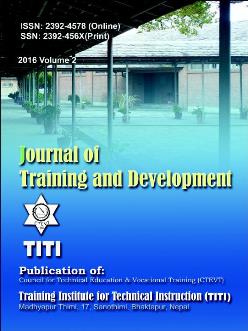Understanding the Challenges of Women in Non-Traditional Occupations
DOI:
https://doi.org/10.3126/jtd.v2i0.15437Keywords:
Women, vocational training, nontraditional occupation and challengesAbstract
This qualitative case study research was conducted to understand the perception of women in non-traditional occupations in Nepalese context. Seven participants from four nontraditional occupations, namely electrical, motorcycle mechanics (automobile), light vehicle driving and mechanical lathe operator were selected from Kathmandu valley. The data were collected using interview and focus group discussion.
The findings revealed that involvement of Nepalese women in non-traditional occupations are very nominal. It is due to the conventional thinking towards women that they should do only the household chores. Non-traditional occupations for Nepalese women have not been women-friendly, however, they may if they do not feel inferior to male and avoid hesitation to work in these professions. The biggest challenge for women in these professions is the societal disbelief on the women’s work. They are behaved with suspicion by people and the society. Leg pulling and backbiting nature of people towards women in this profession are also the serious problems for them. Nevertheless, the female participants have got support from their family and organizations. Moreover, they have played significant roles from beginning to date to inspire them to continue their work.
Downloads
Downloads
Published
How to Cite
Issue
Section
License
Authors who publish with this journal agree to the following terms:
- Authors retain copyright and grant the journal right of first publication with the work simultaneously licensed under a Creative Commons Attribution License that allows others to share the work with an acknowledgement of the work's authorship and initial publication in this journal.
- Authors are able to enter into separate, additional contractual arrangements for the non-exclusive distribution of the journal's published version of the work (e.g., post it to an institutional repository or publish it in a book), with an acknowledgement of its initial publication in this journal.
- Authors are permitted and encouraged to post their work online (e.g., in institutional repositories or on their website) prior to and during the submission process, as it can lead to productive exchanges, as well as earlier and greater citation of published work (See The Effect of Open Access).




